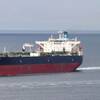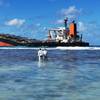The USS Fort McHenry arrived off the coast of West Africa in November to lead an international team of experts that will train African sailors to confront the daily challenges of illegal fishing, piracy, drug trafficking and oil smuggling.
The amphibious ship is the centerpiece of the new Africa Partnership Station (APS) initiative. During its seven-month deployment, it will serve as a floating platform in the strategically important Gulf of Guinea, where it will promote regional maritime safety and security.
The West Africa program is modeled on a successfully completed Global Fleet Station mission in the Caribbean that helped promote port security and stronger borders in Belize, the Dominican Republic, Guatemala, Honduras, Jamaica, Nicaragua and Panama.
The vessel will make numerous port visits, beginning with Senegal, where it will conduct engineering training and focus on small boat handling for coastal security organizations. Additional stops are scheduled in Cameroon, Gabon, Ghana, Liberia, and Sao Tome and Principe.
En route to the region, the Fort McHenry augmented its passenger list with specialists from France, Germany, the United Kingdom and Spain and officers from Nigeria, Cameroon and Ghana. Denmark, Italy and Portugal are also providing military staff support.
The training teams will be working together to provide customized training.
The initiative is supported by the U.S. National Oceanic and Atmospheric Administration (NOAA), the U.S. Agency for International Development (USAID), and the U.S. departments of State and Homeland Security.
African students will be ferried between their home ports and the Fort McHenry on a high-speed Swift boat. In a port call to Limbe, Cameroon, in December, 100 Cameroonians will embark for a two-week session for leadership and personnel training.
Passengers also will conduct community outreach by renovating local schools and medical clinics.
The training will reportedly focus on port security, maritime law enforcement and small boat operations, which are essential to port security and coastal border patrol.
The Coast Guard will be providing a rotating team of four trainers and a staff officer. The continuous presence of the Fort McHenry will allow them, and other trainers, to reinforce what they have taught students with follow-up training.
NOAA will train 30 Ghanaians in the spring to improve scientific data collection and the monitoring of fish catches. The training also will focus on endangered species, such as sea turtles, that should not be caught.
USAID’s personnel are not sailing with the ship, but will team up when it visits countries where there is a mission, such as Liberia, Senegal and Ghana. USAID plans to hold a bird flu conference in Ghana, and there are tentative plans to donate veterinary lab equipment.
[Source: http://usinfo.state.gov]
Subscribe for
Maritime Reporter E-News
Maritime Reporter E-News is the maritime industry's largest circulation and most authoritative ENews Service, delivered to your Email five times per week










